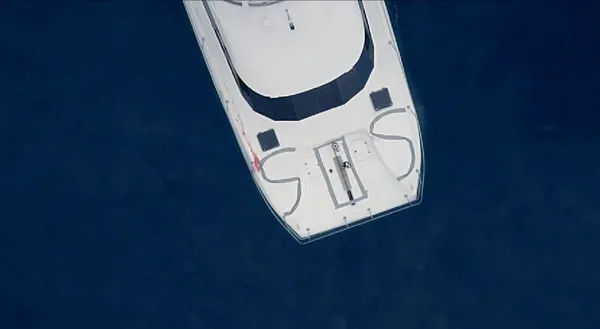 |
| Harpoon |
One of the standout films at this year’s Fantasia, Rob Grant’s Harpoon has gone on to make a big impression on the festival circuit. It’s the story of three people stranded together on a boat, their longstanding friendship quickly giving way to treachery – but if you think that sounds like familiar stuff, it will surprise you. I caught up with Rob just before the film’s screening at Grimmfest in Manchester to ask him about the film and its succss.
The Grimmfest directors had taken an interest in his previous films, he says, but it was mainly due Arrow picking up Harpoon that it ended up joining the line-up. He’s in New York as we speak – the film has just premièred there – but is about to fly to Grimmfest, where he’s also looking forward to watching the Soska sisters’ new take on Rabid.
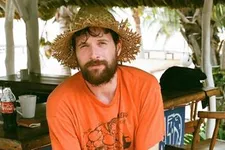 |
| Harpoon director Rob Grant |
“My first experience with Grimmfest was lovely,” he says. “It’s a single theatre, it had a dedicated audience. Everybody goes to the same movies, you come out, you go and have a beer and talk about it, so I’m excited for the audience there to have to deal wit this movie.”
Did he expect Harpoon to attract so much interest from festivals when he was making it?
“While you’re making it you try to just blot out all the noise,” he says, “but I would be lying if I didn’t say that you aren’t crossing your fingers and hoping that festivals take it one because without that, you know, the movie doesn’t really have a chance to hit the marketplace... Especially for indies you’re reliant upon the festivals to champion this stuff o that distributors and sales teams see it and audiences hear about it. It’s this weird relationship that we have that’s kind of necessary for everyone.”
Some outlets are describing it as based on the work of Edgar Allan Poe, whose Narrative Of Arthur Gordon Pym Of Nantucket is referenced partway through, but I got the impression that other ideas in the script were older. Which is true?
“The original idea was always just three former friends stuck on a boat having to survive but I can’t write a script straight away, it’ll usually take me a couple of years to get the ideas correct, so somewhere about a year after having the idea I read the Edgar Allan Poe story and decided, oh, that would be hilarious if the characters in the movie were also aware of that coincidence and trying use that as part of their survival techniques. It was just part of my weird humour that I decided that would be funny to put in there.
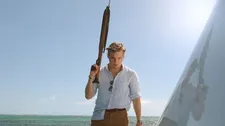 |
| Harpoon Photo: Courtesy of Fantasia International Film Festival |
“Originally I had the premise but I didn’t know what I was trying to say with the movie until I realised that I had more to say about friendship and betrayal.”
Without that, he says, the film would quickly have become stale and repetitive because the location meant there was nothing to hide behind.
“I learned pretty quickly in the rehearsal process. I found that the actors were nervous about being boring so they would move around and try to be flashy and all this stuff and I would be like ‘Guys, what are you doing?’ For better or worse you’ve got to to be confident that what you’re talking about is important enough that you can just sit and not have to move and round and try and make yourself more entertaining than you need to be.
“There’s very little blocking. When they’re sitting and talking they don’t move, and that was intentional and then that informed the camerawork. That had to be still as well. It lad me down the road of okay, I only want to shoot single camera so that I can focus just on the performances and the angles and it all came down t just trying to be confident that what they’re saying is engaging enough that we didn’t have to do any extra, flashy stuff. I was definitely nervous because there’s nowhere to hide bad performance, bad camerawork, bad writing in this movie. If it was bad, it was going to be spectacularly bad!” He laughs.
“We knew that going in, at least. I think we were prepared to be okay if it didn’t work.”
That same situation means that it’s a huge opportunity for the actors to show what they can do, I suggest. How did he build up their confidence and get those performances out of them?
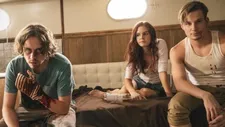 |
| Munro Chambers, Emily Tyra and Chris Gray in Harpoon |
“I don’t know if I ever got their confidence,” he confesses, “but I found people that are okay with failure. I think that’s an important element with a movie like this because I showed them the script and we had the conversation like, ‘This is either going to work or it’s not and we’re all going to look like idiots.’ I needed to find actors that were open to that. They could have looked really stupid but they were willing to let me expose them to that.”
How did he actually find them?
“Emily [Tyra] and Chris [Gray] came from 360 Management, which is a company that I worked with on another show, with another one of their actors. We didn’t have the money for a casting director on this one so me and Mike [Peterson, one of the producers] literally just went to 360 and went ‘Hey, we’ve got this script, would any of your talent be interested? Do you think they might be a good fit for this?’ And it just so happed that they were like ‘Hey, yeah, we like what you guys are doing – here’s a list of people that we think might work.’ And it was just through that process that we found Emily and Chris.
“Munro [Chambers] I found because I edited my producer’s last movie, Knuckleball, and Munro’s the main villain in that. The problem was that I was so used to editing his performance and seeing this villain that I was like ‘Oh, I don’t know if he’s the right fit,’ and then it was Mike that said ‘You have to work with him.’ And thank God I did because – without giving away spoilers – his character is kind of like the lynchpin of the story and I think he gives a wonderful, changing performance.”
I mention how much I enjoyed Knuckleball and ask Rob if he thinks his background as an editor informed the way he shot Harpoon.
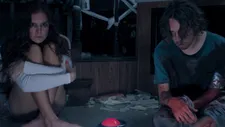 |
| Unlucky at sea |
“It makes me more economical for sure, because people say ‘Oh, do you need to get this coverage?’ and I say ‘No, I know how it’s going to cut. I don’t need that.’ It’s interesting because people always ask ‘How do you edit your own work? Isn’t that hard?” And actually I have this complete dissociation once I’m in the edit chair. It’s like it’s not my movie, it’s just someone’s movie and we’ve got to make the best version we can.
“Sometimes, to my detriment, I’m actually more ruthless than I should be. Mike will be like ‘Why did you cut that out?’ and I’ll be like ‘Oh, its boring,’ and he’ll say ‘No, it’s good. You should keep that in.’ But there’s a reason that it’s 82 minutes. It’s because I’m very cognisant that I don’t want to bore people. It’s always let’s keep it short, let’s keep it tight and then let’s get the hell out of here!”
It’s perhaps easier to keep this particular film tight because it has a narrator. When did he decide that was going to be the case?
“We were in the writing phase and once I knew that I wanted these people to be old friends, old friendships have that shorthand, almost like inside jokes, and just the way they talk with one another, that I really wanted to capture. You can’t do that if they also have to say all this expositional backstory. So I knew from that first draft. I was like, well, let’s just use a narrator to set up their relationships. It gives them permission to just act and talk the way they would, as if all this information was common knowledge... Through various versions we also realised, oh, this is also helping to open up to some of the comedy. It just became a bigger thing and helped me to set up some of the jokes and stuff like that. That was the evolution of it.”
There are a lot of superstitions referenced in the script, about what it is and is not wise to do at sea. Were there superstitions on set as well?
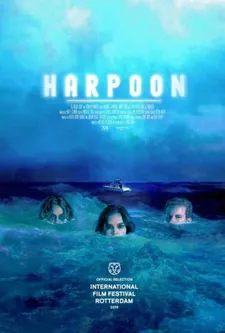 |
| Harpoon poster |
“Oh yes!” he declares. “That albatross, right? My production designer said the second that albatross came on set, all sorts of problems kept happening. Like, power would go out and stuff. So when we flew to Belize he actually refused to bring the albatross on the plane. I was like, ‘Fair enough!’ I don’t know that I’m a superstitious person but I don’t want to tempt fate. It was interesting looking all that stuff up but I definitely didn’t want to mess with a lot of it!”
How did they shoot the scenes where characters are in the water? Were they as simple as they look or was a lot of safety apparatus needed?
Here, Rob decides to share a secret.
“Belize actually has the world’s largest natural reef bank because Australia’s is all dying but the thing that that did for us was it kept the waters relatively calm, and the reality is, through camera trickery, if we were to call ‘Cut!’ the actors would be able to stand up in every spot where they’re in the water.” He laughs – it is a very effective deception. “It actually worked perfectly because it made it super safe so we didn’t need a dive team. If anyone got into trouble in the water they literally would just stand up.”
So how does he intend to follow this film?
“I’m writing another one,” he says. “I’ve been open and honest about this though. I’m nervous about the state that indie films are in and how difficult it us to make some money back. If I do another one I need t be careful that I’m not wasting my financers’ money or otherwise it’s just an expensive hobby. So I’m just trying to work out how I can make the next one and try to give my financers a fighting chance! In a crowded marketplace. So I’m writing the next one, I hope it’s going to be cool.”
He’s done lots of different jobs in film over the course of his career – writing, directing, editing, cinematography, even trying his hand at acting. Which of those does he see himself focusing on in future?
“I think the goal is to just play pretend in whatever way makes sense for a film, you know? I love editing my friends’ movies. The goal would just be to do what the Duplass brothers do. It seems like they get to shoot their own stuff and then they just help their friends make movies and that seems like a really cool family environment. I grew up on Cassavetes movies and that’s kind of like making pasta for the film set. I just love the idea of everyone working together to make interesting stuff so any way that I can do that with my friends and colleagues is the ideal situation.”





















